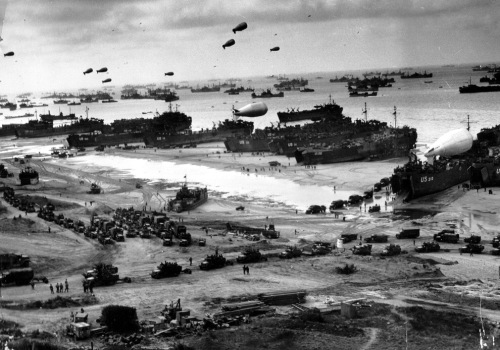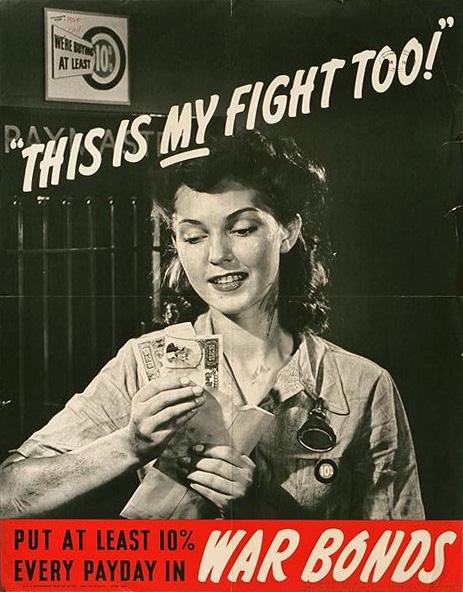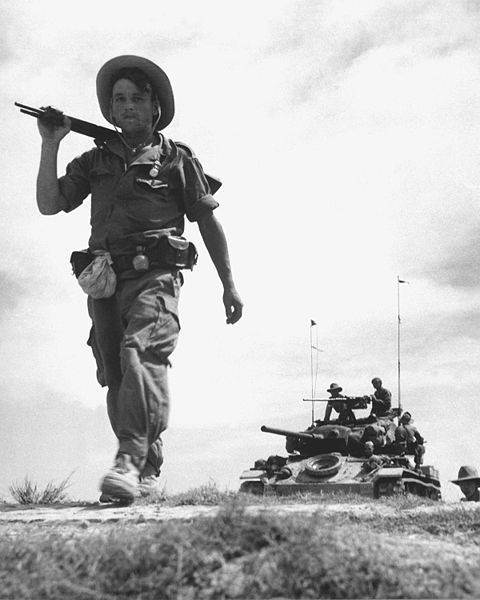
Friends of Padre Steve’s World,
I find the days around Memorial Day and the anniversaries of the Battle of Midway and the D-Day landings to be a time when I become quite reflective about what it means to be a career American military officer, combat veteran, and the son of a Navy Chief who was also a combat veteran. I am also an uncle to a young man who likely will be enlisting in the Army in the coming weeks.
When he spoke on Omaha Beach during the ceremony marking the 70th Anniversary of the D-Day landings President Barak Obama said:
“We are on this Earth for only a moment in time. And fewer of us have parents and grandparents to tell us about what the veterans of D-Day did here 70 years ago. As I was landing on Marine One, I told my staff, I don’t think there’s a time where I miss my grandfather more, where I’d be more happy to have him here, than this day. So we have to tell their stories for them. We have to do our best to uphold in our own lives the values that they were prepared to die for. We have to honor those who carry forward that legacy, recognizing that people cannot live in freedom unless free people are prepared to die for it.”
All of my adult life I have strived to uphold those values that those men were prepared to die for, and for almost 38 years of Army and Navy service that I have been prepared to do so at a moment’s notice.
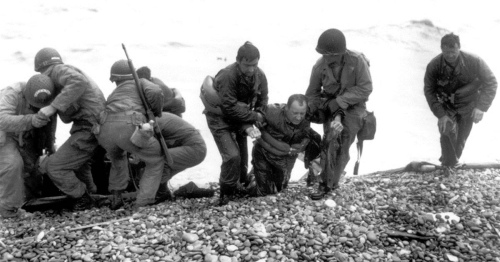
Seventy-five years ago the liberation of France began on the beaches of Normandy. Soldiers from 6 Allied Infantry and 3 Airborne Divisions supported by an Armada of over 5000 ships and landing craft and several thousand aircraft braved weather, heavy seas and in places fierce German resistance to gain the foothold on beaches named Omaha, Utah, Gold, Sword and Juno. Over the next seven weeks the Allied soldiers advanced yard by yard through the hedgerows and villages of Normandy against ferocious German resistance before they were able to break out of the lodgment area and begin the drive across France. In his D-Day message to his troops General Dwight Eisenhower reminded them that their mission was “the elimination of Nazi tyranny over oppressed peoples of Europe, and security for ourselves in a free world.” There are still those in the world who subject their people to tyranny and attempt to destabilize and overthrow the governments of liberty loving peoples, likewise Eisenhower knew that security for ourselves meant close alliances with those who have our values and not isolating ourselves from the world.
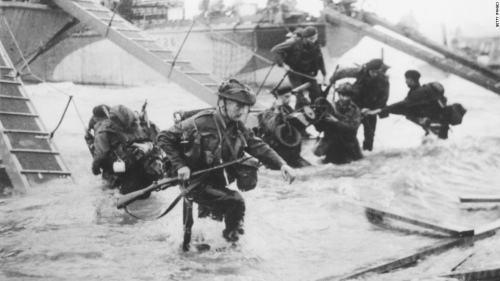
The fighting was bloody, most American, British and Canadian infantry battalions and regiments suffered nearly 100% casualty rates in Normandy. Replacements were fed in at a cyclic rate to make up the losses even as fresh divisions flowed ashore, but the losses were terrible. By the time the landings took place, the British having been at war for nearly five years were bled out. They had little left to replace their losses. From Normandy on the British were losing combat power at a rate that they could not make up.
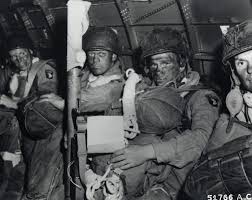
For the Americans there was another problem. The US High command decided to limit the Army to 90 Divisions. Many of these were committed to the Pacific and Mediterranean theaters. Likewise, American Infantry units were generally made up of the lowest caliber of recruits, led often by the poorest officers; the best went to either the Air Corps or technical branches of the Army.
Now this is not to criticize veterans, but it is a factor in the campaign. Most US Infantry Divisions with the exceptions of those previously blooded in North Africa and Sicily often performed badly in action. Some, after being manhandled by the Germans had their leadership replaced and became excellent combat units. However, every new division that arrived in France after D-Day always got the worst of their initial engagement against German forces.
While performance suffered there was another problem for the Americans. With the limitation in number of divisions, they stopped building infantry divisions, upon whom the bulk of the campaign depended. Thus they had little in the way of trained infantry replacements to make up heavy losses in Normandy. By late 1944 during the Battle of the Bulge the American infantry crisis was so bad that 30,000 Air Corps candidates were trained as infantry and soldiers from support units such as Ant-Aircraft battalions were used to bolster infantry units.
Had the Germans been able to hold out and had they not been bled white by the Red Army on the Easter Front, had they not lost the nearly their entire Army Group Center in the Red Army offensive of 1944 it is conceivable that the British and American offensive in the West would have ground to a halt for lank of infantry in 1945. In spite of this there was no lack of individual courage among the troops engaged; the courage and sacrifice of all who fought there should not be forgotten.
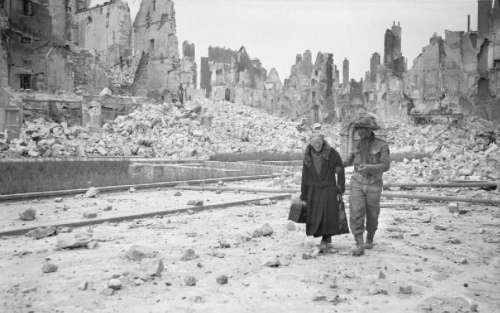
The human toll among the combatants both Allied and German, as well as the local populace was especially traumatic. While the American, Canadian and British people are keen to remember the sacrifices made by our soldiers we often forget the toll among the French civilian population of Normandy as well as the German soldiers, mostly conscripts, sacrificed by the Nazi regime. Normandy suffered more than any part of France during the liberation. In the months leading up to D-Day Allied Air Forces unleashed hell on Normandy to attempt to lessen potential German resistance. The Allied Naval bombardment added to the carnage ashore and once the campaign began the combined fires of both Allied and German forces devastated the region. Whole cites such as Caen were destroyed by Allied Air forces and an estimated 30,000 French civilians were killed during the Normandy campaign, 3000 on D-Day alone. I think it can be said that the blood of the civilians of Normandy was shed for the freedom of all of France.
The campaign in Normandy was one of the most viciously contested in western military history. German forces, especially Paratroops of the 2nd, 3rd, 5th and 6th Fallschirmjager Divisions, German Army Panzer Divisions such as the 2nd, 21st, 116th and Panzer Lehr and those of the Waffen-SS, especially the 1st, 2nd and 12th SS Panzer Divisions held the line against ever increasing Allied forces. As they sacrificed themselves Hitler refused to commit more forces to Normandy and insisted that his Army contest every meter of ground. He forbade his commanders to withdraw to more defensible positions along the Seine.
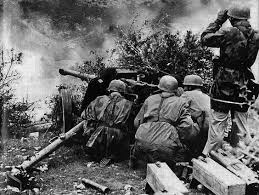
Hitler’s decisions actually shortened the campaign. Whatever the crimes of the Hitler Regime and Nazism, which were among the most heinous in history, one can never question the valor, courage and sacrifice of ordinary German soldiers. For those Americans who lump all Germans who fought in World War II with the evil of the Nazi regime, please do not forget this fact: There are those today, even in this country that make the same charge against Americans who have fought in Iraq and Afghanistan and those at home and abroad who have labeled the US as an aggressor nation. As President Trump continues to go his own way to make the United States a pariah nation, including pardoning convicted war criminals, we have to be very aware of the costs of it and also remember that the Americans who went ashore on D-Day did so to help defeat a pariah nation that had flaunted every standard of justice in attempting to make Germany Great Again. When you judge others, know that the same standard will be applied to you someday and it is possible that our day may come sooner than we think. It is as Justice Robert Jackson who served as the Chief Prosecutor at the Nuremberg War Crimes Tribunal wrote:
“If certain acts of violation of treaties are crimes, they are crimes whether the United States does them or whether Germany does them, and we are not prepared to lay down a rule of criminal conduct against others which we would not be willing to have invoked against us.”
Normandy was a near run thing for the Allies. First the weather almost delayed it by 2 to 4 weeks. Had that happened the Germans might have been even better prepared to meet the invasion. Likewise, the Red Army’s devastating offensive which annihilated Army Group Center in June kept the Germans from transferring additional forces from the Russian Front to Normandy. On D-Day itself there were a number of times where Lady Luck, or maybe the Deity Herself, saved the Allies from disaster.
Any person who has seen Saving Private Ryan, The Longest Day or Band of Brothers knows a little bit about how close Overlord came to failure. Allied Airborne units were dispersed throughout the region after they drooped. Many units were not fully operational for more than a day as they sought to organize themselves and gather their troops. At Omaha Beach the Americans had not counted on the presence of the first rate German 352nd Infantry Division. This division, despite being pounded by naval and air forces almost cause General Bradley to withdraw from Omaha. At Utah the soldiers of the 4th Infantry division escaped a similar mauling by landing on the wrong beach. Had they landed at the planned beaches they would have ran into the same kind of resistance from well dug in German forces. At Gold Juno and Sword British forces benefited from confusion in the German command which kept the 21st Panzer Division from descending on the British forces and quite possibly splitting the British zones.
The Allies benefited from the absence of Field Marshall Erwin Rommel, Commander of Army Group B who because of the ad weather assumed no invasion was possible and traveled to German to celebrate his wife’s birthday. Finally, and perhaps most important they benefited by Hitler’s refusal to immediately commit forces, including his Panzer reserve to defeat the invasion at the beachhead.
For those who fought in Normandy and those civilians who lived through it the memories are still vivid. Many suffer the effects of PTSD, grief and other wounds, physical, emotional and spiritual. When one is exposed to the danger and destruction of war, the smell of death, the sight of burned out cities, vehicles and the suffering of the wounded and dying, it makes for a lifetime of often painful memories.
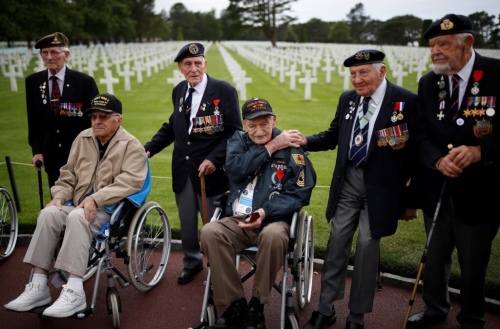
For some of the German, British and American veterans, the struggle in Normandy has given way to long lasting friendships. Many of those who fought against the Allied onslaught became fast friends after the war. Those who fought against each other were soon allies as part of NATO and soldiers of nations which were once bitter enemies serve together in harm’s way in Afghanistan. The generation that fought at Normandy is rapidly passing away, their numbers ever dwindling they remain a witness to courage, sacrifice and reconciliation.
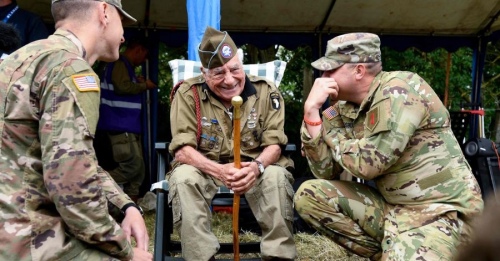
In the end it is reconciliation and healing that matters. Some scars of war never pass away; some memories are far too painful to release. Yet we who serve often strive to reconcile. In 2002 while deployed at sea for Operation Enduring Freedom I was an advisor to a boarding team from my ship. It was our job to make sure that impounded ships which were breaking the UN embargo on Iraq were not in danger of sinking, and that their crews had food, water and medical care. Since many of these ships remained at anchor for 2-4 weeks in the heat of the Arabian Gulf, this was important.
The delays imposed by UN rules sometimes meant that the sailors of these ships grew resentful. It was my job to spend time with the Masters of these ships to keep things calm and work out any issues that arose. On one of these ships I met an Iraqi merchant skipper. The man was well traveled, educated in the U.K. in the 1960s and in his career a frequent visitor to the US. In 1990 he was the senior captain of the Kuwaiti shipping line. Then Saddam Hussein invaded Kuwait. As a result of this when Kuwait was liberated he lost his job. His nation was an international pariah. Since his life was the sea he took up the only job possible to support his family, what he knew best, captaining ships. He was most apologetic for the trouble that he and others like him caused us. We shared much during those visits. One of his daughters was in medical school and other children in university. He longed for the day when Iraq would be free. On our last talk before his ship was released he remarked to me “I hope one day we will meet again. Maybe someday like the American, British and German soldiers after the war, we can meet in a pub, share a drink and be friends.”
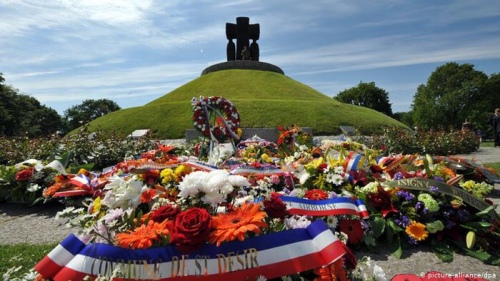
Symbols of Reconciliation at the German Cemetery in Normandy
I too pray for that, especially after my tour in Al Anbar five years after I encountered that Iraqi Merchant Captain. Maybe someday we will. I thought of him almost every day that I was in Iraq. I only hope that he and his family have survived the war, the continuing violence in Iraq and are doing well. There is hardly a day that goes by that I do not think of this man or the Iraqis that I had the honor of serving alongside in Al Anbar in 2007 and 2008.
President Obama remarked in Normandy last week about the veterans of the 9-11 Generation of service members, of which I and so many others like me are part:
“And this generation — this 9/11 Generation of service members — they, too, felt something. They answered some call; they said “I will go.” They, too, chose to serve a cause that’s greater than self — many even after they knew they’d be sent into harm’s way. And for more than a decade, they have endured tour after tour.”
The survivors of the D-Day landings and those on the other side of the hill are continuing to pass from the bonds of this earth and into eternity. The youngest of the living are now in their early to mid 90s, some are over 100. We owe it to them and to the world to make what they sacrificed themselves to do into reality, battling tyranny and striving for peace and security.
Their generation built the pillars of peace and economic security that President Trump often mocks, criticizes, or condemns. D-Day was just part of their story. The burden is now on we the living to carry the torch of freedom that they once held. My military career of 38 years will come to an end early next year, but my nephew Darren will be completing Marine Corps Basic Training in a few weeks. He wants to become an infantryman and maybe serve with Marine Security Forces or Special Operations. I am proud of him.
Peace,
Padre Steve+










